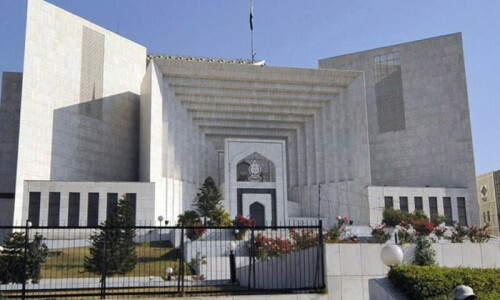BAGHDAD, Sept 30: At least 49 people were killed, most of them children, in a series of devastating car bombs that left a trail of carnage in Baghdad and northern Iraq on Thursday.
The attacks were unleashed as another 10 hostages, including two Indonesian women, were kidnapped while Britain and France were scrambling to try to secure the release of their nationals held hostage by militants.
The bloodiest attack was a twin car bombing at the site of a ribbon-cutting ceremony for a new water pumping station in the poor Al Amel neighbourhood in southwest Baghdad.
Many curious children had gathered to watch the ceremony when the bombs went off, sending clouds of black smoke billowing into the air. "The attacks today were those of a desperate enemy," said Lt Col James Hutton of the US military. "There is no conceivable justification for attacking innocent Iraqi civilians who were attending the opening of a water pumping station."
A bloodied witness said he helped carry out 32 bodies of children from the rubble. There were scenes of hysteria and chaos at Baghdad's Yarmuk hospital, where doctors said they received 41 bodies from the bombings. Iraq's Health Minister Alaadin Sahab Adwan later put the toll from the attacks at 42.
The US military said 10 soldiers were also wounded in the attack and that a third car bomb went off in the area at the same time near an Iraqi national guard checkpoint.
The attacks followed another car bombing west of the capital that killed one US soldier and two Iraqis and wounded 13 including three soldiers, according to the military. Bloodshed also spread to northern Iraq with four killed and 16 wounded in a car bombing in Tall Afar, where US and Iraqi forces battled guerrillas in early September.
In other incidents, a soldier with US-led forces whose nationality was not immediately known was killed in a rocket attack on a US military support base near Baghdad.
The Iraqi government and US-led forces have blamed foreign fighters for many of the car bombings accusing groups including alleged Al Qaeda operative Abu Mussab al Zarqawi of wanting to plunge the country in a never-ending cycle of death and kidnappings to derail elections scheduled for January.
Iraq's Deputy Prime Minister Barham Saleh vowed that his government was determined to retake cities like Fallujah by November and to hold elections as planned. "We aim to regain control of these areas before the month of November," he told reporters. "The government is determined to go ahead with elections... the elections will be held as scheduled."
US warplanes raided at dawn a suspected safe house of Zarqawi's partisans northeast of Fallujah, the military said, in the latest of a relentless campaign against suspected hideouts and meeting places of the Zarqawi group.
Medics said three people were killed and 14 wounded. The military says the strikes have eliminated scores of Zarqawi's followers and disrupted his network, but doctors claim that many of the victims of the raids are women and children.
The raids on the city, considered a no-go zone for American troops since an April offensive ended in a stalemate, could be the prelude to a major effort to occupy Fallujah before the first free Iraqi elections in decades.
HOSTAGES: As the Americans hammered Zarqawi's lair, Britain hoped desperately to free 62-year-old British engineer Kenneth Bigley, kidnapped by the group on Sept 16 in Baghdad, along with two US colleagues who have since been beheaded.
Hours after a heart-rending video of Bigley pleading for his life aired on Arab television, Prime Minister Tony Blair said his government was willing to have contact with the kidnappers.
"Of course, if they did make contacts, that would be something we would immediately respond to," said Mr Blair. In the blurry video on Al Jazeera television, a caged Bigley, dressed in an orange prison jumpsuit, begged Mr Blair to set free all female prisoners in Iraq.
Stuck in the awkward position of making overtures to Zarqawi's organization, the most ruthless of the militant groups operating in Iraq, Foreign Secretary Jack Straw rushed to qualify the government's stance.
"We've made it clear, we have a policy which we adhere to, strictly and always, that we don't negotiate with hostage takers," Mr Straw said. But the hostage crisis took another turn for the worse with Al Jazeera Television showing a purported tape from a group announcing it is holding 10 hostages. -AFP















































Dear visitor, the comments section is undergoing an overhaul and will return soon.